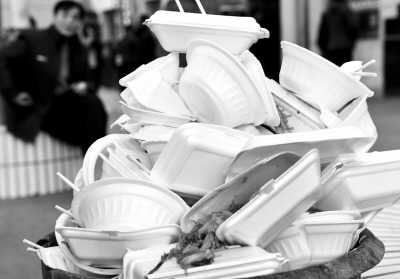Pollution fears as ban on plastic foam items lifted
 0 Comment(s)
0 Comment(s) Print
Print E-mail Shanghai Daily, May 3, 2013
E-mail Shanghai Daily, May 3, 2013
The end of a 14-year ban on the sale and use of disposable food containers made of plastic foam has sparked concerns over pollution and potential health risks.
 |
|
It is estimated there are at least 100 to 200 production companies in China with an annual capacity of 14 billion dinnerware items made of plastic foam. [File photo] |
The time was right for the ban to end, the National Development and Reform Commission said, as plastic foam could now be recycled to become raw materials in construction, paints and stationery.
A decision to ban plastic foam dinnerware was imposed in 1999 over environmental pollution concerns.
However, the lifting of the ban on Wednesday has not met with universal approval.
Dong Jinshi, deputy general secretary of the Beijing Society for Environmental Sciences, said a recycling system had not yet been established and it was more dangerous to use such products today as many companies were using waste plastic to make dinnerware.
"There are no authorities supervising the issue, and there is a legal vacuum," Dong said.
He said companies should be subject to regulations governing production quality.
Despite the ban, dinnerware made of plastic foam was still widely used in restaurants, particularly by street vendors and at small eateries, because it was so cheap to produce.
In Shanghai, garbage bins and plastic bags inside a digital products shopping center in Xujiahui area were filled with disposable dinnerware made of plastic foam, the Wenhui Daily newspaper reported earlier. On Wanhangdu Road, a restaurant was seen using disposable dinnerware made of plastic foam to hold food, it reported. In a survey conducted by the newspaper and Shanghai University, 81 out of 221 residents said they would throw away disposable dinnerware after use rather than ensure they were put in recycling bins.





